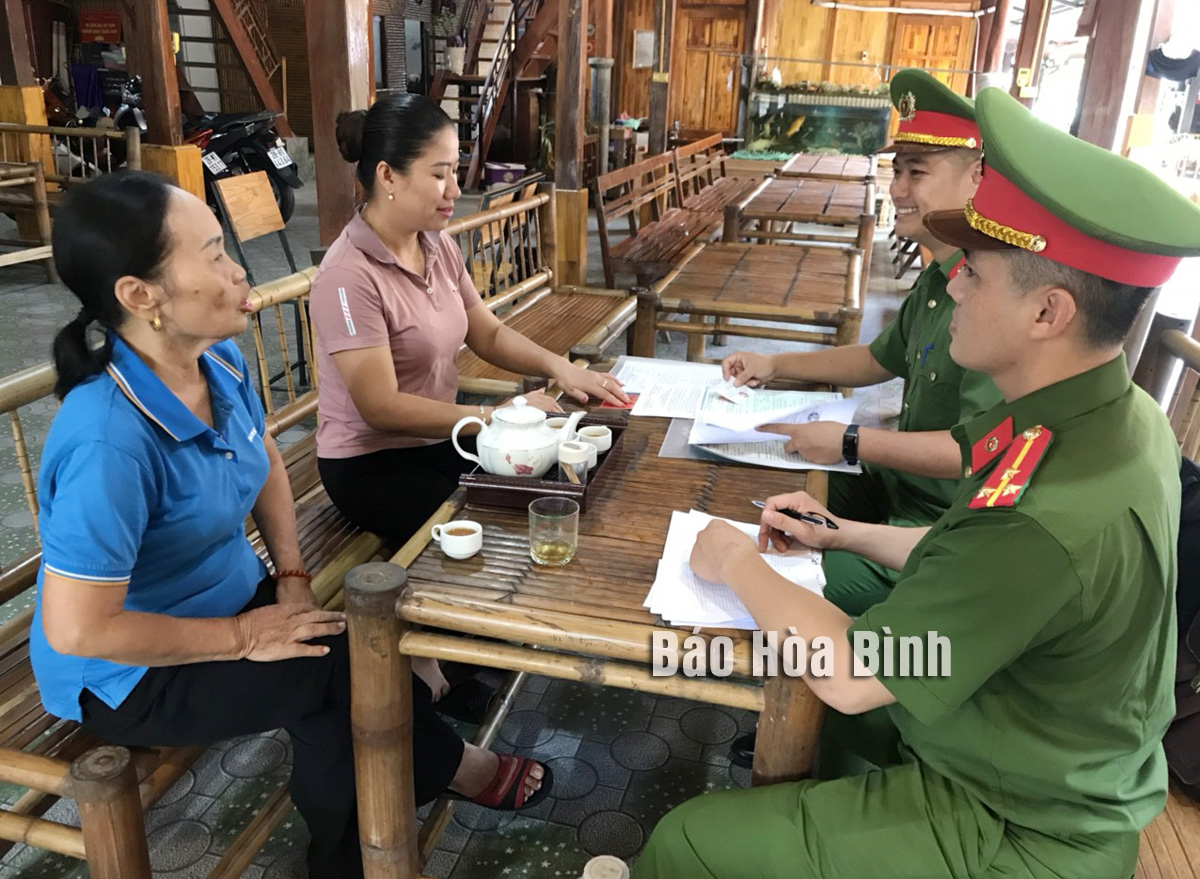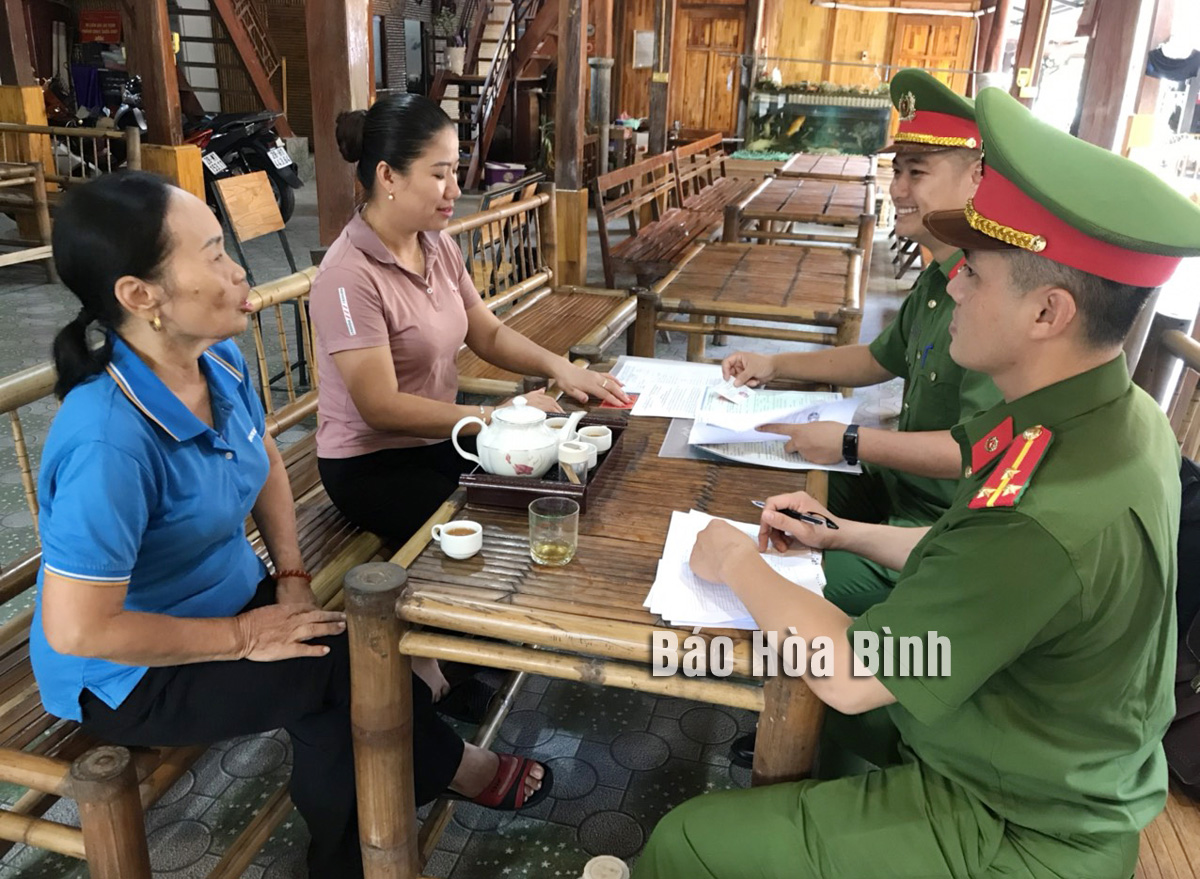
Mai Chau district has firmly established itself as a standout destination on Vietnam’s tourism map, attracting both domestic and international visitors with its breathtaking landscapes, rich ethnic culture, and warm hospitality. However, beyond its natural and cultural charm, a secure and well-managed tourism environment has added to Mai Chau’s appeal.
Police of Chieng Chau commune disseminate
regulations on lodging management and security for accommodation service
providers in Lac Village.
Chieng Chau commune, home to the renowned Lac Village,
is considered the tourism hub of Mai Chau district, welcoming hundreds of
thousands of visitors each year. According to Captain Nguyen Tuan Anh, deputy
chief of the Chieng Chau public security division, the locality is home to 103
accommodation establishments, with 86 under the police's direct managemnent.
Thanks to effective public security measures,
including community engagement in the "All People Protect the Fatherland's
Security" movement, Chieng Chau has maintained an exemplary track record in
public order and tourism safety. From 2024 to March 2025, the commune recorded
no legal violations. Authorities conducted 173 patrols to guarantee security.
Moreover, examination and communications have been boosted to ensure all
lodging businesses strictly adhere to guest registration rules. In particular,
grassroots security groups were set up in all the five villages, playing an
active role in working with police to safeguard local security.
Besides Chieng Chau, Hang Kia and Pa Co
communes, home to Mong ethnic communities, have also emerged as tourism magnets
in Hoa Binh province and the northwestern region. Here, local police have
properly advised the local Party committees and administrations about the state
management of security and order while bringing into play the public's role in
ensuring security.
Captain Vang A Hua, deputy head of the Hang Kia
public security division, said the commune has paid great attention to tourism
safety. With a good grasp of the local situation, police have dealt with
violations in a timely manner.
Currently, there are 146 accommodation
facilities in Mai Chau, including 12 hotels, 28 guesthouses, and 103 homestays,
offering a total of 555 rooms. Additionally, an eco-friendly transport
cooperative operates a fleet of 30 electric vehicles to enhance tourist
mobility.
The district features seven community-based
tourism sites, namely Lac, Buoc, Van, Pom Coong, Hich, Pa Co, and Hang Kia
villages. Tourism has not only contributed to local employment and income
improvement but also played a crucial role in cultural preservation. Luxury
resorts, including Avana Resort, Mai Chau Lodge, Mai Chau Ecolodge, Ba Khan
Village Resort, and Mai Chau Hideaway Resort, have further enriched the
district’s tourism offerings, attracting high-spending travellers and
increasing overall tourism revenue.
In 2024, Mai Chau welcomed approximately 773,230
visitors, reflecting a 17.74% growth rate. This included 224,795 international
tourists and 548,435 domestic visitors, generating an estimated 927.876 billion
VND in tourism revenue, a 37.88% increase from the previous year. The positive
momentum continued into early 2025, with tens of thousands of domestic and
international tourists coming to Mai Chau in the first quarter alone.
Hoang Duc Minh, Vice Chairman of the Mai Chau
district People's Committee, said ensuring tourism security and public order
remains a top priority. Security and stability have enabled Mai Chau to
successfully host prestigious cultural and sports events, further elevating its
tourism reputation. Recent highlights include the Vietnam Ultra Marathon 2024,
attracting over 2,200 athletes from 38 countries; the Hanoi–Mai Chau leg of the
Dien Bien Phu Cycling Race, featuring hundreds of national and international
cyclists.
The Standing Board of the Hoa Binh provincial Party Committee has agreed in principle on a proposal by the Standing Board of the Party Committee of Hoa Binh city to gather feedback on the city’s 1:2000 zoning plan, which forms part of its broader urban development strategy.
Hoa Binh province has made notable progress in public administration reform and digital government development, with the satisfaction index among citizens and businesses reaching over 84%, according to recent government evaluations.
Thanks to great efforts by local authorities in recent times, the governance and public administration performance of Mai Chau district has been significantly improved.
In the afternoon of June 6, the Party Committee, the People's Council, the People's Committee and the Fatherland Front of Lac Son district solemnly held a meeting to celebrate the 139th anniversary of the district's founding (1886–2025) and the 79th anniversary of the establishment of the district's Party Committee (1946–2025). There was the attendance of Mr. Bui Van Thang, the Vice Chairman of the Provincial People's Council; Mr. Quach Tat Liem, the Vice Chairman of the Provincial People's Committee; Ms. Dang Bich Ngoc, the Deputy Head of the National Assembly Delegation of the province; as well as the former leaders of the province and district through various periods, who are the natives of the district.
Implementing the Politburo’s Resolution No. 57-NQ/TW on breakthroughs in science – technology, innovation, and digital transformation is a golden opportunity for the northern mountainous province of Hoa Binh to renew growth model, improve competitive edge and shorten digital gap.
Resolution 57-NQ/TW, issued by the Politburo on December 22, 2024, identifies sci-tech, innovation, and digital transformation as strategic breakthroughs to build a developed and prosperous nation. In Hoa Binh province, this spirit is not just a slogan, it’s being put into action through concrete initiatives that form a "new development triangle”: digital citizenship, digital economy, and digital administration.



